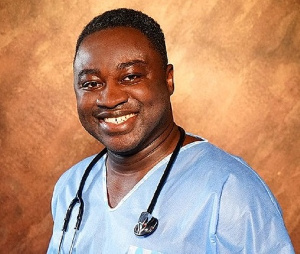 Doctor Patrice Awonseba Baba Musah
Doctor Patrice Awonseba Baba Musah
You'll be surprised to learn how many Ghanaians have achieved remarkable success in their professional lives in other countries while remaining relatively unknown in their home country. One of them is Patrice Awonseba Baba Musah. You may not recognize his name, yet he is one of the most well-known obstetricians in the Czech Republic.
Ghana is a country full of brilliant people, but the majority of them face daily challenges in gaining admission to the appropriate professional institutions they desire, and those who do receive scholarships to study abroad frequently do not return home due to a variety of issues, including an unfavorable political climate, corruption, and underdevelopment.
Baba Musah, 36, was born in Bolgatanga, Ghana, and is known in the Czech media as "an angel among healthcare workers" for assisting mothers in safely delivering their kids. His mother worked as a cook at a nursing school, and his father worked as a clerk.
"As a kid, I was always quite bashful during talks with the girls," Musah says, unaware that he would one day become a gynecologist. Faced with numerous obstacles in his path, he even pictured himself dressed as a priest, However, his desire to work in medicine was sparked at the start of his studies when he got the opportunity to see a birth.
Musah, who excelled in general science subjects such as physics, mathematics, English, and agriculture while in high school in Ghana, chose to seek a scholarship abroad. He first applied for a scholarship to study pharmacy in Russia, but his application was denied due to technical difficulties. He then tried the Czech Republic in 2005 and was successful.
Patrice Awonseba Baba Musah is the chief of the ambulance at the Institute for Mother and Child Care (PMD) in Prague-Podol, where he is in his third year of employment. He studied several things in the Czech Republic throughout his medical education, including how to overcome his fear of swimming.
According to Musa, Ghana's population peaked at 14 million people in 1992. "I believe that the census at that time never took place in many settlements located across the river." However, today's population is 28 million, thanks to advances in medical care and the survival of many children after delivery. "Births sometimes compound superstitions," he adds.
Some families prefer to give birth on a specific day so that they can name their children. When they start giving birth to another day, problems occur. "This refers to the royal families' requirement that a child is born on a specific day to become king," he explains.
"I had no idea I wanted to be a doctor until I received a scholarship to study pharmacy." "I'm not the worst student. I could study medicine," a teacher claimed at a language school in Mariánské Lázn, a town in the Cheb District in the Karlovy Vary Region of the Czech Republic. Musah stated, "She forced me to apply to medical school. I tried it, and now I'm a doctor."
The gynecologist and obstetrician who chose to stay in the Czech Republic after graduation delivered thousands of babies, and last year he was nominated for an Angel among healthcare professionals award and won first place in one of the highest medical awards given to medical practitioners in the Czech Republic, for his charm and sense of humor in the medical field. Adam Vojtch, Minister of Health, also congratulated the winners.
"The sheer participation in the event was the valuation," Musah remarked in an interview with Helena KOOV. Honestly, I was pleasantly surprised, and that made me very pleased. It's wonderful to be recognized for the work you accomplish. It also implies that I'll have to put in more effort to make people happy, particularly women. "
Patrice Musah is not the only one in his family who works in medicine; he has three sisters who work as midwives and a younger brother who has a finance degree. He enjoys football as well as being a diligent doctor. After spending fifteen years in the Czech Republic, Dr. Musah aspires to return to Ghana to aid the health sector, but will he be able to do so despite his love for his homeland?
Many Ghanaians are unable to appreciate what they have because of tribalism. Who can blame Patrice Awonseba Baba Musah for not returning to Ghana after graduation to assist strengthen and expand the medical industry, knowing how those from the country's northern regions are constantly discriminated against and despised?
Musah talks about his personal experience with the coronavirus pandemic. "Even if the department is full, there is occasionally only one individual who is optimistic." It was mentally taxing, and it was especially difficult on pregnant women. Fortunately, the deliveries of attractive young women went off without a hitch." It was very difficult to organize; you could only go to her, and there was only one paramedic, so we took turns.
"To me, it implies that everyone has the same chance to do whatever they desire." In certain nations, is a stumbling block for a stranger who has risen to the position of the department head or worked at the clinic," he concluded.
